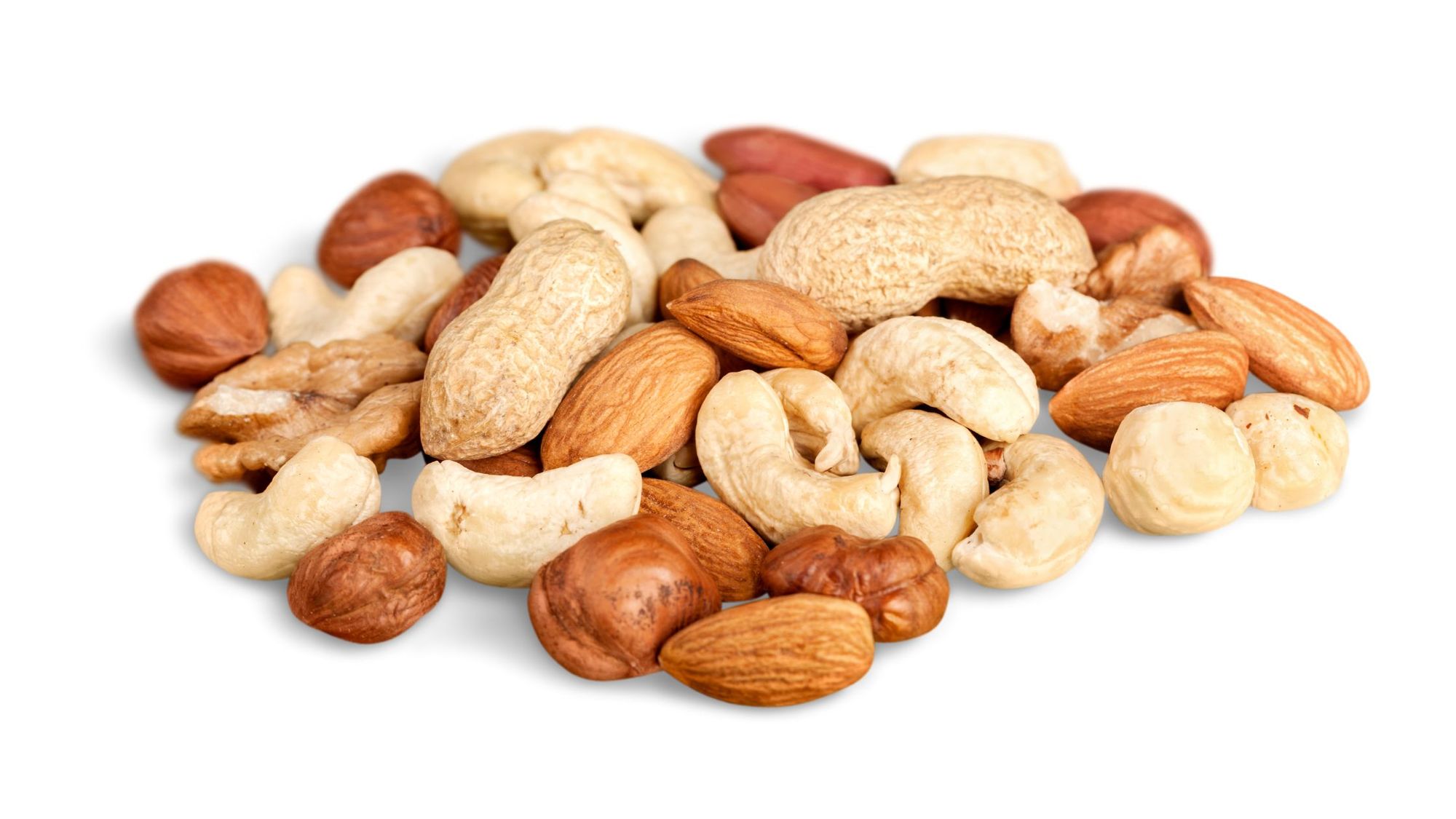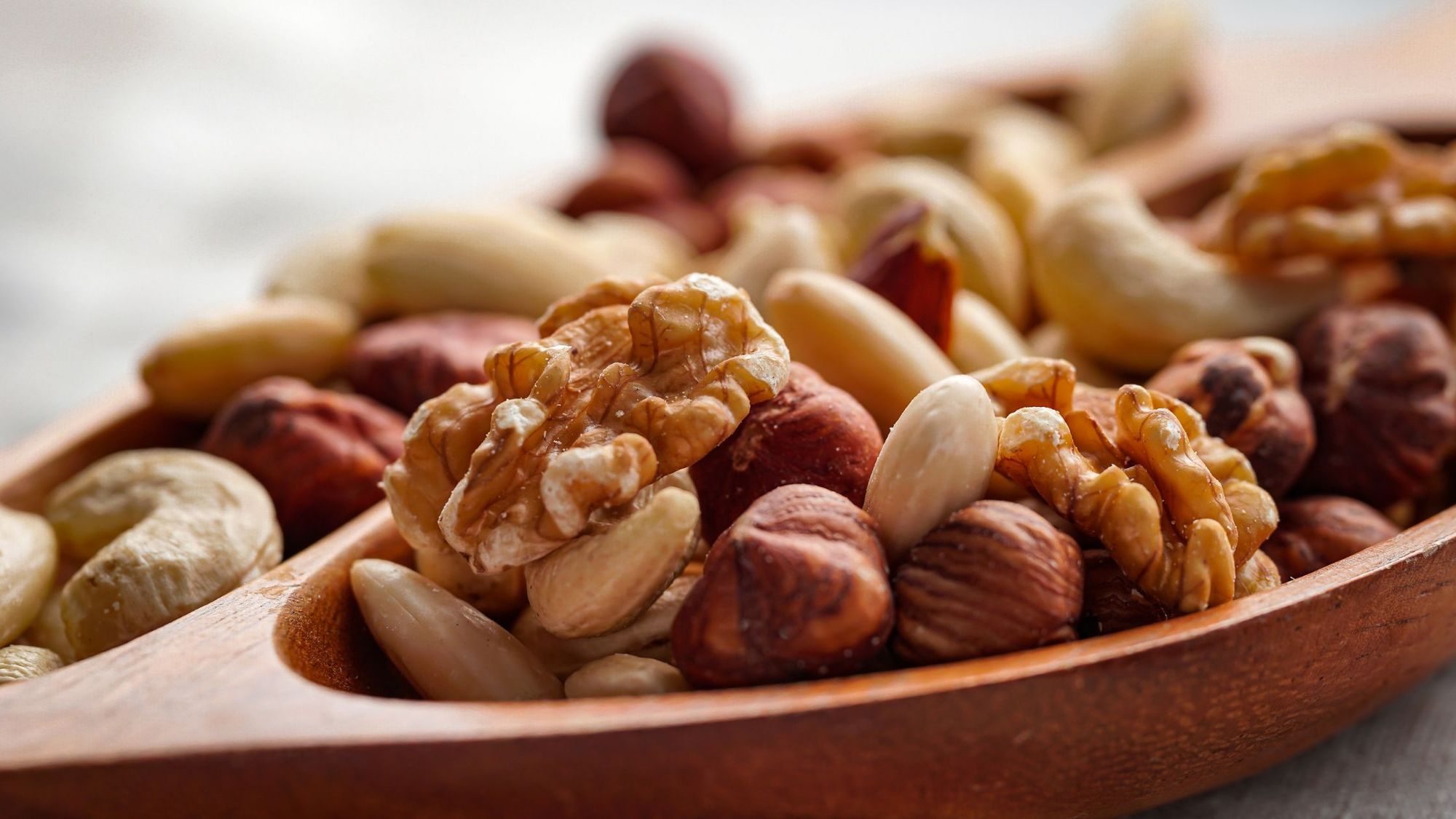
The health benefits of different types of nuts will definitely vary based on each nut, but what remains certain is that all types of nuts are almost always pretty delicious. Loaded with the good kind of healthy fats, and plenty of vitamins and minerals, they can be an excellent addition to any diet and help give your body the boost it needs in order to stay healthy. But that doesn’t mean you don’t have to be careful.
However, as much as there are nutritional benefits of incorporating different types of nuts into your diet, it’s important to remember to eat nuts in moderation, not by the handful. The fact remains that nuts are high in calories, and while they have a lot of good fat, this can still lead to weight gain if you eat too many.
While this guide is to take you through the health benefits of some of the most popular types of nuts, we’re also going to tell you how many of each nut to eat to make up a serving (you might be surprised). You don’t need to eat a lot of these nuts to reap the nutritional benefits.

Are Nuts Good for You?
Nuts are fantastic for your health, and studies have even shown that they can be beneficial in maintaining a healthy body weight if eaten in moderation, thanks to the multitude of vitamins and minerals found within them. They are a superb source of fiber, good fats, and plant protein while also being delicious to eat alone or when paired with various dishes.
Additional studies have linked eating nuts to reducing the risk of several health conditions, most prominently heart disease. The fact that they are such a versatile food makes them easy to incorporate into your diet, and they are a brilliant choice for kids and adults alike and can even be a wonderful way to help relieve stress.
You just need to watch out for the calories. Since nuts are quite calorie-dense and have large quantities of fat, it is very easy to overeat them – especially since they are so small. Keeping them as a little snack is the best way to go as well as watching your portion sizes.

Health Benefits of Different Types of Nuts
Now we get to the exciting part, where we can take a deeper look at the health benefits of different types of nuts. Below, you will find some of the most popular types of nuts, what makes them so good, and a few serving suggestions.
Almonds
Almonds are a classic and delicious nut, and the recommended serving is 30g which contains 184 calories and 6.7g of fat. Almonds are great for your heart and cholesterol because of the monounsaturated fat that they contain as well as fiber and vitamin E. They are also the nut with the highest calcium content, which is important for keeping our bones strong throughout our lives.
If you eat them with the skin on, they can be beneficial for your gut health as well. In addition to being eaten alone, almonds are also great in salads, as well as more exotic recipes such as Moroccan lamb.
Pecans
These sweet nuts are popular in desserts, and the recommended serving of 30g contains 207 calories and 21g of fat. They are loaded with plant sterols, which help manage cholesterol and benefit heart health. This is further supported by the fact that they are rich in antioxidants that work to prevent the arteries from hardening.
Furthermore, pecans are full of oleic acid, the monounsaturated fat found in things like olives and avocado and also works to improve heart health. I love to have my pecans in a pie, but for healthier options you can also pair them with squash and spinach pasta, as well as with a roasted beet salad if you want to try something a little healthier.
Cashews
Cashews are definitely up there in terms of the top three most popular and most delicious types of nuts, and the recommended serving size of 30g contains 172 calories as well as 14.5g of fat. What makes them so good for you is that they can be beneficial for heart health because they reduce blood pressure while also improving blood lipid levels.
If you are following a vegetarian or vegan diet, their benefits only increase because cashews are high in zinc, magnesium, and iron. These are essential for your health, and magnesium can help to improve your memory and work to prevent age-related memory loss.
Cashews are absolutely delicious when thrown in with a stir fry, a currey, or used to make a cashew dip.
Walnuts
Walnuts are considered a ‘superfood’ for a reason. Walnuts are one of the best nuts out there for your overall health, and the recommended serving of 30g contains 206 calories and 20.6g of fat. They contain masses of omega-3 fatty acids, which is what makes walnuts fantastic for brain health. Additionally, their high concentration of good fats and minerals is why they are so important for those on a plant-based diet.
There are some studies that show walnuts could be beneficial to fighting certain types of cancer due to their antioxidant content, and these studies have also shown that walnuts are excellent for gut health. They are delicious alone and in fruity desserts, but they can also be a delicious savory accompaniment to dishes such as pasta and snack boards.
Chestnuts
If you’re searching for nuts that are lower in fat and calories, chestnuts are the ones you want. The recommended serving size of 30g contains 59 calories and 3.1g of fat. They are also an excellent source of protective antioxidants, which are good for boosting your immune system and helping you stay healthy. They are also rich in starchy carbs and fiber.
When eaten raw, they are an excellent source of vitamin C, but they are most popular ground up for use as gluten-free flour in cakes and bread. Additionally, chestnuts are delicious when roasted and are a lovely accompaniment to roast squash and pancetta. This is part of the reason they are so popular during the winter months.
Brazil Nuts
More of us should eat these delicious nuts; the recommended serving of 30g contains 205 calories and 20.5g of fat. However, they are also the nut with the highest concentration of selenium, a protective antioxidant responsible for improving our immune system while helping wounds heal faster.
Up to three Brazil nuts per day are all you need to get the recommended amount of selenium – that’s how much of it they contain. In addition to selenium, Brazil nuts also contain vitamin E and help to regulate blood lipids. They are delicious when used to make burritos and pair wonderfully with chicken if you want to try some new dishes.
Hazelnuts
If you like Nutella, you already know how tasty these nuts are. The recommended serving size of 30g contains 195 calories and 19.1g of fat. They are the second-richest nut in monounsaturated fat and have anti-inflammatory properties that can help manage blood lipids. All of this is what makes them an excellent nut to eat for heart health.
They are rich in numerous vitamins and minerals, especially vitamin E, and they aren’t just delicious when transformed into a sweet treat. They can be used in celeriac and truffle soup as well as carbonara and as an accompaniment to mustard carrots.
Pistachios
This is another nut that is very popular in desserts, and the recommended serving size of 30g contains 169 calories and 13.6g of fat. It also brings a gorgeous colour to dishes because of the pigments it contains, which have antioxidant properties. This is great for your immune system and overall health, but pistachios have a lot more to them.
They contain the highest amount of potassium of all nuts, and they contain plenty of nutrients to support heart health. Additionally, they work wonders for protecting the eyes, thanks to the aforementioned antioxidants and nutrients. While they are great alone, pistachios are also delicious in ice cream, salad, and even as an ingredient in meatballs.
Final Thoughts
Nuts have so much that they can offer us, and hopefully this article has answered some of your most pressing questions about the health benefits of different types of nuts. Perhaps it has even inspired you to try a few new nuts (and maybe new recipes involving nuts as well.)
For more information about the optimal diet plan for you, why not take the time to take a quick CircleDNA test to see what kind of foods might benefit your body the most? You might just discover a few new things about your health and body, including which foods you might need to eat more or less of, based on your genetic makeup.
As always, it’s crucial to check for nut allergies before trying any new nuts that you don’t normally eat.
References:
- NCBI, Changes in Nut Consumption and Subsequent Cardiovascular Disease Risk Among US Men and Women: 3 Large Prospective Cohort Studies: https://www.ncbi.nlm.nih.gov/pmc/articles/PMC7428648/
- NCBI, Nut consumption and risk of metabolic syndrome and overweight/obesity: a meta-analysis of prospective cohort studies and randomized trials:https://www.ncbi.nlm.nih.gov/pmc/articles/PMC6013998/
- NCBI, Health benefits of almonds beyond cholesterol reduction:https://pubmed.ncbi.nlm.nih.gov/22296169/
- NCBI, Brazil nuts: Nutritional composition, health benefits and safety aspects:
https://pubmed.ncbi.nlm.nih.gov/28888463/ - NCBI, The Effect of Cashew Nut on Cardiovascular Risk Factors and Blood Pressure: A Systematic Review and Meta-analysis (P06-117-19):https://www.ncbi.nlm.nih.gov/pmc/articles/PMC6573847/
- NCBI, Composition of European chestnut (Castanea sativa Mill.) and association with health effects: fresh and processed products: https://pubmed.ncbi.nlm.nih.gov/20564434/
- NCBI, A Hazelnut-Enriched Diet Modulates Oxidative Stress and Inflammation Gene Expression without Weight Gain:
https://www.ncbi.nlm.nih.gov/pmc/articles/PMC6637671/ - NCBI, A Pecan-Rich Diet Improves Cardiometabolic Risk Factors in Overweight and Obese Adults: A Randomized Controlled Trial:
https://www.ncbi.nlm.nih.gov/pmc/articles/PMC5872757/ - NCBI, Pistachios Increase Serum Antioxidants and Lower Serum Oxidized-LDL in Hypercholesterolemic Adults:
https://www.ncbi.nlm.nih.gov/pmc/articles/PMC3140215/ - NCBI, Pistachio nuts: composition and potential health benefits:
https://pubmed.ncbi.nlm.nih.gov/22458696/ - Science Direct, Dietary walnut altered gene expressions related to tumor growth, survival, and metastasis in breast cancer patients: a pilot clinical trial:
https://www.sciencedirect.com/science/article/pii/S0271531718311904







Comments are closed.